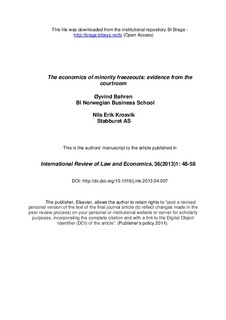The economics of minority freezeouts: evidence from the courtroom
Journal article, Peer reviewed
Permanent lenke
http://hdl.handle.net/11250/93832Utgivelsesdato
2013Metadata
Vis full innførselSamlinger
- Scientific articles [2173]
Originalversjon
10.1016/j.irle.2013.04.007Sammendrag
We analyze minority freezeout offers in a legal environment where minority stockholders can reject the offer and ask the court to value their nontendered stock. This regulatory setting allows us to observe the disciplining effect of legal enforcement on stockholder behavior. We find that minority stockholders reject about one out of ten freezeout offers, and that rejection is more likely when the bidder has controlled the firm for quite some time before the offer. Rejected offers take on average around three years to be settled in court, and litigation costs are almost never paid by minority stockholders. The court mostly prices rejected offers above the offer price, particularly when the firm is private, when the bidder has controlled the firm for an extensive period before the offer, and when the case is large. These findings suggest that minority stockholders consider most freezeout offers commensurate with the level of legal stockholder protection as enforced by the courts. The majority stockholder tends to underestimate the legal protection of minority rights in settings where these rights are particularly vulnerable to exploitation. Nevertheless, minority stockholders who take their case to court often face years of waiting, and for a highly unpredictable litigation return.
Beskrivelse
This is the authors’ manuscript to the article. Also published at http://www.ssrn.com/
